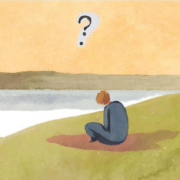Douglas Noordsy, MD, Bringing Lifestyle Interventions to Psychiatry

Stanford psychiatrist Douglas Noordsy, MD, is a physician who literally walks his talk. For the last 40 years, he has woken up at 6 a.m., drank a glass of water, and gone for a run, often with his dog.
“Living a healthy lifestyle has always been an integral part of my life. I share lifestyle interventions [such as daily exercise] with my patients because these practices have worked for me,” says Dr. Noordsy, Head of the Stanford Lifestyle Medicine Cognitive Enhancement pillar.
As a practicing psychiatrist for more than 35 years, editor of the book Lifestyle Psychiatry, and founder of the Stanford Lifestyle Psychiatry Clinic, Dr. Noordsy has played an integral role in incorporating lifestyle medicine into traditional psychiatry care. Dr. Noordsy’s research interests at Stanford include medication and the impact of exercise and nutrition for individuals with schizophrenia and bipolar disorder. He is currently Director of the Lifestyle & Sports Psychiatry special initiative in the Department of Psychiatry.
“With lifestyle psychiatry, clinicians utilize three methods of care—psychotherapy, medication, and lifestyle interventions,” he says. “This three-pronged approach helps us to be more effective physicians, and patients have a better chance at achieving their best outcomes.”
Northeastern Roots
Doug Noordsy always knew he wanted to be a physician. Initially thinking he would go into primary care, he shadowed his family’s doctor as a high school student in Syracuse, New York. As an undergraduate, he took pre-med courses at St. Lawrence University, a small liberal arts college in upstate New York.
“In my junior year, I took the ‘Introduction to Psychology’ course and I fell in love with it,” he says. “I was particularly interested in those with significant disorders such as schizophrenia—I was intrigued by how they thought. So those early experiences drew me into psychiatry.”
In the 1980s, he attended medical school at Washington University in St. Louis, Missouri. During this time, neuroscience and psychopharmacology were becoming more advanced, which led to debate among mental healthcare professionals about the relative merits of pharmaceuticals over psychotherapy.
“We learned about psychotherapy and medication, but lifestyle medicine wasn’t on the table at that time,” says Dr. Noordsy. “There was discussion about the importance of social support, but we didn’t consider how other aspects of lifestyle affected mental health, such as exercise, nutrition, and mind-body practices.”
After completing his residency at Dartmouth-Hitchcock Medical Center in New Hampshire, he served as a Professor of Psychiatry at the Geisel School of Medicine for 25 years. At Dartmouth, he was also the Director of Psychosis Services and an Investigator in the Psychopharmacology Research Group.
“At Dartmouth, there was an emphasis on treating patients in a collaborative, recovery-oriented way rather than a paternalistic approach,” says Dr. Noordsy. “It was important in my early development to be trained in a model of care that was respectful of the wishes and preferences of the patient.”
Leading a Movement
Dr. Noordsy was ahead of his time regarding the connection between lifestyle medicine and mental health. As a medical school student, he managed his own mental health using lifestyle practices such as daily exercise, healthful nutrition, and quality sleep. He found benefit with these practices and shared them with his patients.
“At first, I was shy about sharing my experiences because they weren’t evidence-based at that time. It’s counter-academic to share things with patients from your own life that are not supported by clinical trials,” he says. “But over time, the evidence caught up.”
Indeed, over the last 15 years, research on lifestyle medicine has shifted the narrative from personal anecdotes to gaining attention and respect within the medical community. Specifically, Lifestyle Psychiatry has moved from something psychiatrists recommended softly to valid, evidence-based medicine.
In the fall of 2015, Dr. Noordsy came to Stanford to join the Department of Psychiatry & Behavioral Sciences, which was building a team for student-athletes. Many of the athletes wanted to minimize medication exposure, so he continued to recommend lifestyle interventions as options to support their mental health.
In 2019, Dr. Noordsy coined the term “Lifestyle Psychiatry” by publishing a book with that title. This book is a curation of research from around the world detailing the evidence on lifestyle practices in psychiatry. In 2020, he opened the Stanford Lifestyle Psychiatry Clinic. In 2024, the president of the American Psychiatric Association (APA) promoted lifestyle interventions as a core component of psychiatric treatment, bringing this approach into the mainstream.
In his 35-year career, Dr. Noordsy has been a member of the Schizophrenia International Research Society, the International Early Psychosis Association, the American College of Lifestyle Medicine, and a fellow of the APA. He received the Exemplary Psychiatrist Award from the National Alliance on Mental Illness in 2001 and the Excellence in Leadership Award from the Stanford Department of Psychiatry and Behavioral Sciences in 2018.
Although Dr. Noordsy is a nationally acclaimed psychiatrist, his most significant source of pride is his influence on how psychiatric care is delivered. For severe disorders, psychiatry has had a long history of authoritarian care in some settings. With lifestyle psychiatry, where patients choose from a menu of lifestyle practices as part of their treatment plan, the care model shifts from “the doctor knows all” to one where the psychiatrist collaborates with their patients, respects their wishes, and takes a whole-person approach.
“What I’m most proud of is being part of a movement toward empowering and engaging patients to participate in their own health and well-being, rather than just be compliant to their doctor’s instructions,” says Dr. Noordsy. “I’m proud to be part of a new approach to care that promotes mental health by fostering relationships, savoring nutritious meals, and experiencing the beauty of nature at sunrise.”








